THE TRUTH IS ALWAYS ON THE OTHER SIDE
How accurate are dog DNA tests? - Or we can also ask: “How accurate are human DNA tests?”😂😂😂We unleash the truth!
https://www.cbc.ca/news/business/marketplace-dog-dna-test-1.6763274
Note: And why different results? Because 1. NOBODY has yet proven that there is a so-called DNA and 2. on the DNA software there are x millions of fraudulent letter groups that are juggled and tried until these so-called “scientists” or “lab rats” find a few identical letters!!!!
If you're puzzled about the breed of your dog, you aren't alone. There are a number of dog DNA companies to help owners uncover the mysteries of their mutts.
But a Marketplace test found dog DNA tests geared toward consumers won't necessarily give owners the answers they're looking for.
Marketplace recruited two mixed-breed dogs, one purebred dog and one human (Marketplace's very own Travis Dhanraj) to test the accuracy of consumer dog DNA tests. Their DNA was sent to four companies that claim to specialize in dog genetic testing: Wisdom Panel, Embark, Accu-metrics and DNA My Dog.
Nearly all the results were different, even for the same dog, despite all claiming nearly 100 per cent accuracy rates.
WATCH | The full Marketplace investigation:
Curious about what breed your dog is? You're not alone. Dog DNA testing kits are soaring in popularity. Marketplace recruits several dogs and puts four companies to the test to see which ones are worth the cost and most accurate.
Meet the dogs
Molly, a five-year-old rescue dog from Kuwait, had stumped owner Marilyn Burbidge for years.
"We think she may be Saluki-Anatolian shepherd, but when you look at her she looks husky, so we have no idea."
Elinor Karlsson, the director of the Vertebrate Genomics Group at the Broad Institute of MIT and Harvard, says when a dog appears to be a mix of many breeds, you shouldn't rely on conventional traits — like looks or behaviour — to determine the breed.
"People tend to hone in on particular characteristics that they associate with breeds," said Karlsson, "but once you mix many different breeds together, the traits start interacting with each other."
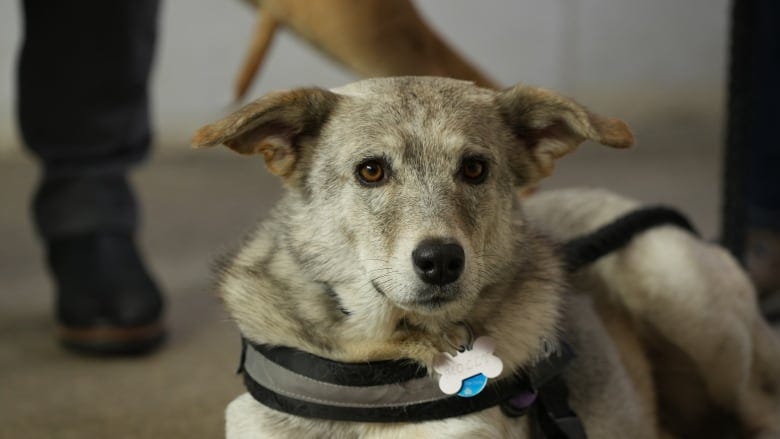
The second dog tested was Loki, a 75-pound, three- or four-year-old rescue from Istanbul. A former street dog, his owners say he was in a shelter with about 300 other dogs before he was brought to Canada.
"Our guess is some type of terrier-hound mix," said Jennifer Yip Arnette, who adopted Loki in April 2022. "Our groomer thinks he's a descendant of the Irish hound, but he's too small for that breed. So we get asked a lot…. We don't know."
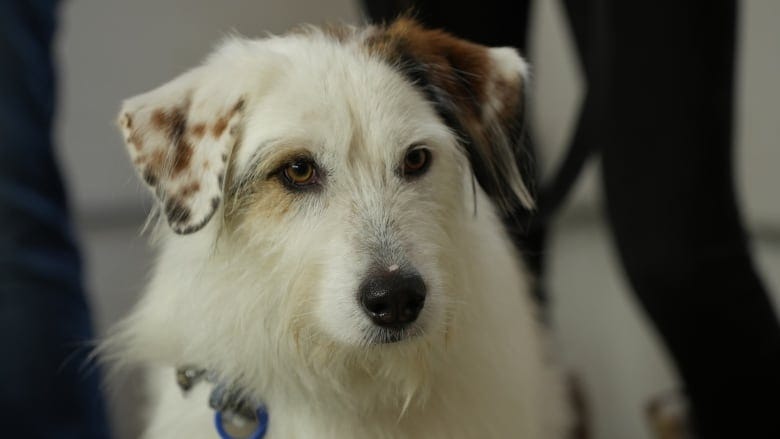
The third dog tested was Quinn, a 16-month-old purebred Great Dane who is also a service dog.
"Am I 100 per cent sure she's 100 per cent Great Dane? Yes, absolutely I am," said Michelle Weger, Quinn's owner.
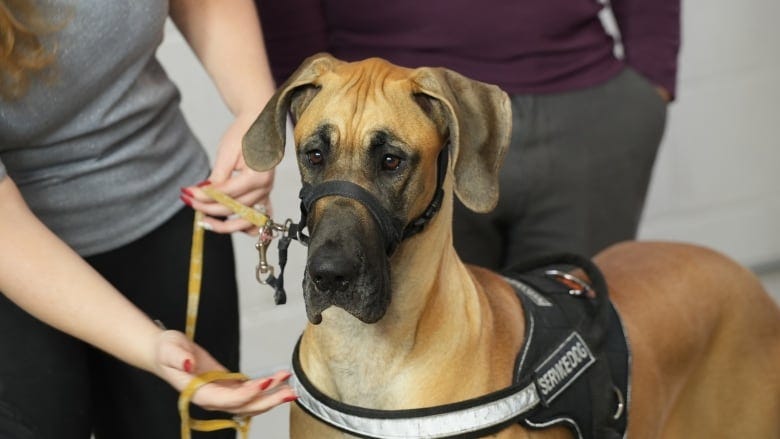
Quinn's breeder provided lineage documentation for Quinn tracing back to her great-great grandparents.
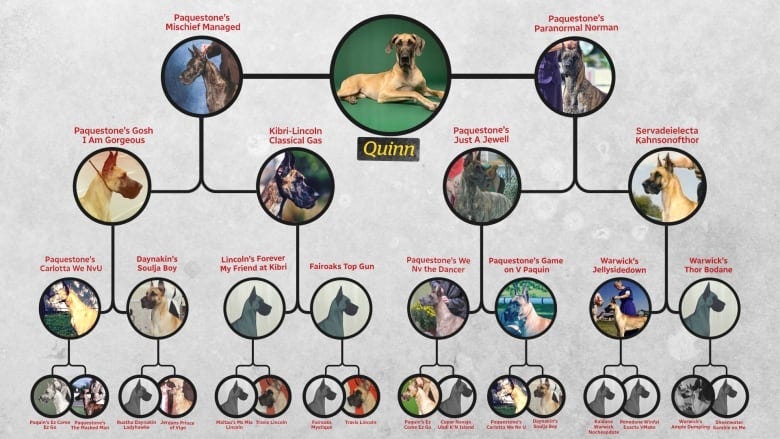
Quinn is Weger's service dog for narcolepsy. A well-bred, large purebred dog was important to Weger, who experiences cataplexy, a symptom of narcolepsy where an individual can collapse when experiencing strong emotions. Quinn will sense when a collapse is about to happen, and cue Weger to sit down to avoid hitting her head, typically by grabbing her arm.
Meet the companies
Marketplace ordered DNA tests from four popular companies offering kits to Canadians.
The $150 kit from Wisdom Panel claims to test for over 350 breeds of dogs and analyze over 25 health conditions. Wisdom Panel markets itself as the "world's most accurate dog DNA test service," and boasts over 98 per cent accuracy.
Another company also markets its test as the most accurate dog DNA test. The most expensive test, purchased for $288, is from Embark, a Boston-based company and research partner of Cornell University.
Marketplace also purchased DNA kits from two Canadian companies. A kit from Toronto-based DNA My Dog cost $113 at the time of purchasing in August 2022. At the time, the company claimed to test for around 100 breeds. Now, the company offers different products at different prices, and says it tests for over 350 breeds. Even when advertising under 100 breeds, the company still advertised between 97 and 99 per cent accuracy.
The final and least-expensive test was purchased from Accu-metrics, also known as Viaguard, for $80. CBC previously reported on the company for providing DNA results of Indigenous ancestry for a chihuahua and three non-Indigenous individuals. The company no longer advertises Indigenous ancestry testing, but does advertise paternity testing, drug testing and fingerprinting services.
All companies asked for a variety of information when submitting samples, including the dog's age, a photograph and in some cases a suspected breed. In most cases, the information was optional to include and Marketplace did not answer.
Due to the questionable results provided by Accu-metrics that CBC previously reported on, Marketplace told the company Quinn, a 52-kilogram Great Dane, was suspected to be a chihuahua, a breed known to be between one and three kilograms. When prompted to enter a suspected breed, Marketplace told Accu-metrics and DNA My Dog that a human sample, provided by Dhanraj, was suspected to be a Central Asian shepherd dog.
The results
In nearly every case, the companies provided different results for each submitted sample.
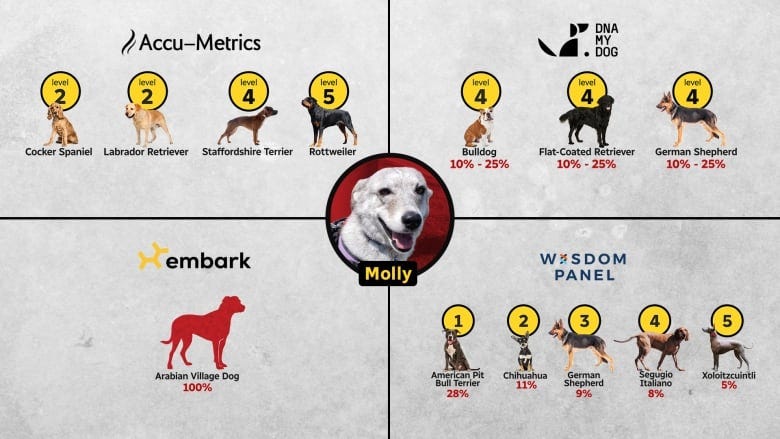
DNA My Dog identified Molly's DNA as having Level 4 bulldog, flat-coated retriever and German shepherd. Level 4, according to the company, represents 10 to 25 per cent of that dog's DNA, and says the breeds are passed down from grandparents and up to great-great grandparents.
Accu-metrics also uses a level system, with Level 1 being a higher percentage of DNA — 75 per cent and above, and Level 5 being five per cent DNA or less. The company said Molly's DNA was identified as containing Level 2 cocker spaniel and Labrador retriever, Level 4 American Staffordshire terrier and Level 5 rottweiler. The company suggests one side of Molly's lineage is purebred cocker spaniels.
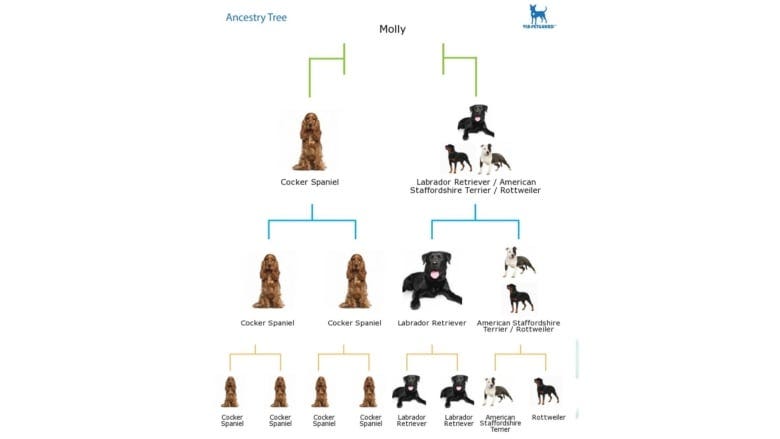
Wisdom Panel by far provided the most in-depth breed breakdown on Molly, suggesting it detected 19 breeds in her DNA. The most prevalent breeds were pit bull, chihuahua, German shepherd, Segugio Italiano and xoloitzcuintli, a Mexican dog known for being hairless.
Embark only identified one breed in Molly: 100 per cent Arabian village dog, a breed not recognized by Canadian, American or European kennel clubs. The company says a village dog is a breed that predates recognized breeds, and whose ancestors are indigenous to a region.

"I was hoping for a lot of clarity but I'm more confused now," said Burbidge upon hearing the results. "What are they doing? What are they testing to get all these different results? Why are they so different if it's genetic?"
Loki received similar results as Molly, with no company identifying the same breed in his DNA.
DNA My Dog identified Loki as Level 1 Belgian malinois and Level 4 Australian shepherd. Level 1, according to the company, means the majority of that dog's DNA comes from that breed. Belgian malinois dogs are known to be high-energy working dogs, often suited for police work.
"He's medium to low energy," said Yip Arnette, laughing. "He sleeps a lot."

Accu-metrics did not provide test results for Loki, despite submitting samples over 11 weeks prior. On the date of publishing, Accu-metrics still had not provided Loki's results.
Wisdom Panel identified 23 breeds in Loki's DNA, including Segugio Italiano, chihuahua and Anatolian shepherd dog.
Embark identified Loki as 100 per cent West Asian village dog.
"At least they're getting the region accurate," said Yip Arnette. "It's disappointing…. It's not telling us anything we didn't know when we sent in the test."
Karlsson says the difference in results likely amounts to which breeds and how many samples are in each company's databases. Like human DNA companies, samples are compared to each company's individual reference sets. If a dog has the genetic makeup of a rare breed, Karlsson says the company might not pick up on it.
"The way the algorithm works is it's like, well, I didn't find a match, so I'm going to go find the next closest thing and just sort of make a guess, and that's where it can get inaccurate," said Karlsson.
But Karlsson says purebred dogs are easier to detect and identify.
For Quinn, Wisdom Panel and Embark both said she is 100 per cent Great Dane, but DNA My Dog said she was also Level 4 Staffordshire terrier.
Weger didn't buy those results, and says Quinn's winning results at dog shows, where she competes to be the best and healthiest representation of the Great Dane breed, speak for themselves.
Accu-metrics identified Quinn as 100 per cent chihuahua, the same breed Marketplace told the company 52-kilogram Quinn was suspected of being. Chihuahuas typically weigh no more than 2.7 kilograms.
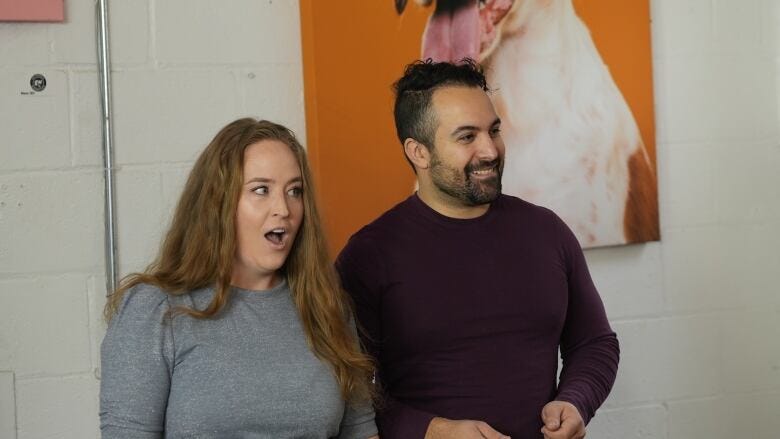
According to experts in genetics, human DNA submitted to a lab testing for dog DNA should result in an error, and not in any type of dog breed.
However, after submitting the DNA of Travis Dhanraj, two companies identified his DNA as belonging to specific breeds.😂
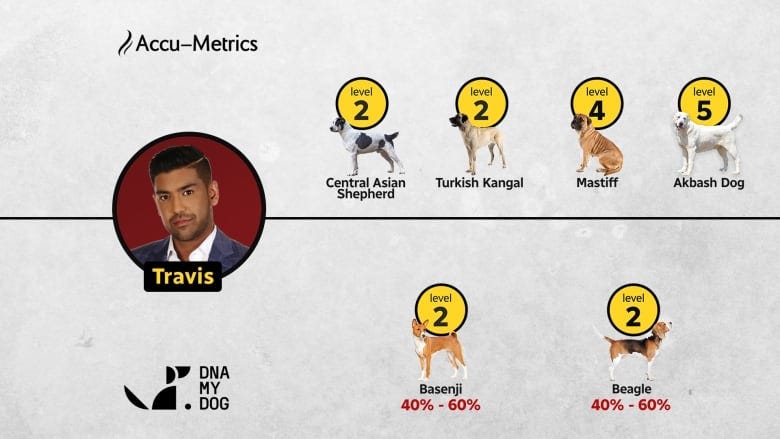
DNA My Dog identified Dhanraj as Level 2 basenji and Level 2 beagle. According to the company, Level 2 could mean one of Dhanraj's parents was purebred.
Accu-metrics identified Dhanraj's DNA as the same breed that Marketplace told the company it "suspected" the breed was: Level 2 Central Asian shepherd dog. As well, it identified Level 2 Turkish kangal, Level 4 mastiff and Level 5 akbash.
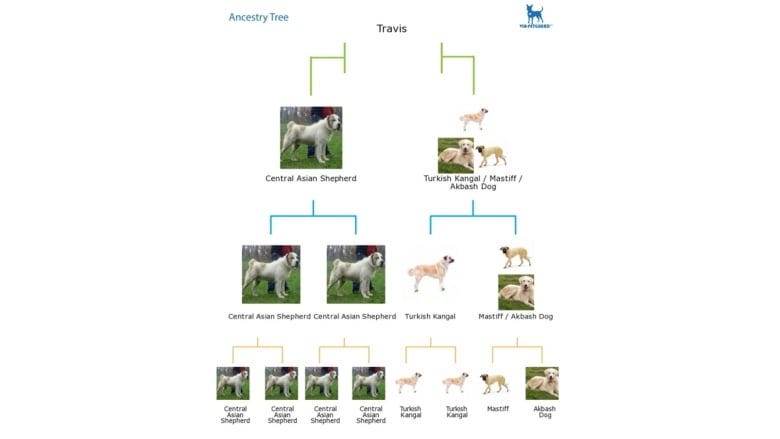
"I'm going to have to have some hard discussions with my parents," joked Dhanraj.
Karlsson was shocked at the results.
"The fact that you're getting breed calls back when you sent the human sample would make me very hesitant to use that company for doing dog testing."
Results from Embark and Wisdom Panel both said testing failed on the human sample.
The companies respond with excuses to defend their pseudo-science - these “lab rats” are never at a loss for excuses!
When Marketplace reached out to the companies, all of them said they stood behind their science.
In an email statement, Accu-metrics said Dhanraj's result was likely from mixing up sample ID numbers, but that the dog results were likely due to cross-contamination during sampling or shipping. The company wrote that it "cannot jump to any conclusions prematurely" and offered to re-test newly submitted samples, and said it has a refund policy "on any flawed tests." It also said results should be interpreted with the understanding that there is a margin for error.
DNA My Dog said that since Marketplace's samples were submitted, it has more than doubled its breed database from 100 to 350 breeds, and it has "implemented a more comprehensive and robust testing platform" to eliminate human error. However, it says that its old testing methods were still "highly accurate," those 100 breeds tested "sufficiently covered the most popular breeds in North America," and if a sample contained DNA of a breed not covered in its database, the closest available match would be assigned to it, "which was typical of the industry."
The company said that assigning breeds to Dhanraj's DNA was due to human error. On Quinn's results, the company said the small percentage of Staffordshire bull terrier is likely remaining DNA from "even before great-great grandparents."
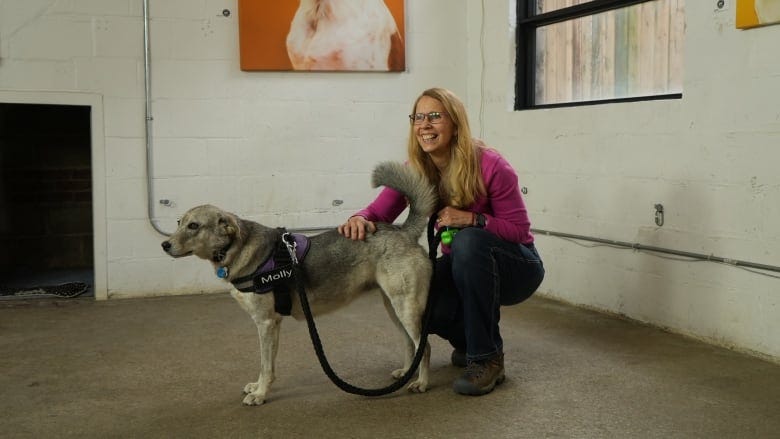
Wisdom Panel says its science is openly available for anyone to see on its website, and while results can vary between companies, its error rates are lower than the industry standard.
Finally, Embark says Molly and Loki descended from populations that existed longer than modern dog breeds and it is proud to be the only company that specializes in village dogs. The company says if other companies report mixed-breed results, those do not reflect the dog's actual ancestry.
While Karlsson is excited consumers are becoming interested in DNA, she warns them to take results with a grain of salt.
"At the end of the day, the way an animal behaves or an animal's health status is a combination of really complicated genetics, but also the environment that they grow up in. And so DNA is only really part of the story."
That's how Burbidge sees it.
"It doesn't make any difference to me truly what breed she is…. It doesn't change the way I feel about her," she said of Molly. "She's my dog and I'm just going to love her just the way she is no matter what."
NOTE: This is not primarily about the typing of dogs, but is intended to show that a so-called DNA determination does not work, since to date NOBODY has ever isolated “DNA” and EVERYTHING is ALWAYS tried to be shown exclusively with fraudulent experiments outside a living organism/system, with software and letter groups that have NOTHING to do with reality and are only a business model! And the so-called “haplotypes” also only exist on software
https://www.ensembl.org/info/docs/tools/vep/haplo/index.html
that is calculated or attempted to be represented somehow using various other types of software on a computer!!! The same with the so-called “genes”!
https://www.softwareradius.com/best-gene-and-genome-annotation-tools-and-software/
It's the same nonsense as with the fictitious viruses, RNA, exosomes, macrophages, bacteria, proteins, etc. etc. - if you read through the methods with the whole mixture of chemical substances including the use of software and designed PCR primers calibrated to the letter groups present in the software (and there are millions of them), then you simply know that THIS is not isolation of a “DNA” - fraudulent experiments with chemically produced solutions, bought with precise instructions, whose final soup is then passed off as whatever is needed, has NOTHING to do with reality - every living organism is unique and will always remain a mystery, no matter how hard you try to solve this puzzle, it will NEVER succeed!!
https://www.illumina.com/informatics/sequencing-data-analysis/dna.html
https://www.dnasoftware.com/about/our-story/
RNase A:
https://assets.thermofisher.com/TFS-Assets/LSG/manuals/MAN0012003_RNase_A_DNase_Proteasefree_UG.pdf
we can read on page 3:
PRODUCT USE LIMITATION
This product is !!!DEVELOPED, DESIGNED!!! and sold exclusively for research
purposes and !!IN VITRO!!! use only. The product was not tested for use in
diagnostics or for drug development, nor is it suitable for administration
to humans or animals.
Protein Software:
https://proteinmetrics.com/byos/
RNA-Software, Version 6.5:
https://rna.urmc.rochester.edu/RNAstructure.html
https://store-restack.vercel.app/p/ai-in-genomics-answer-rna-analysis-software-cat-ai
Enzyme-Software:
https://github.com/aregm/enzyme
https://pypi.org/project/enzyme/
Exosome-Software:
https://github.com/integrativemodeling/exosome
Macrophage-Software:
https://github.com/TailorMed/macrophage
CircMiMi
A package for constructing CLIP-seq data-supported circRNA-miRNA-mRNA interactions
https://github.com/TreesLab/CircMiMi
https://bioconda.github.io/recipes/miranda/README.html
https://github.com/Polymer/polymer-build
https://www.winsite.com/polymers/polymers+polymers/
Polymer Modeler, Version 3.41
https://nanohub.org/resources/9230/supportingdocs
Google Polymer(all of this is and always has been an excellent business model, and if it weren't so harmful to humanity, you could laugh about it endlessly....)
https://cubettech.com/resources/blog/getting-started-with-google-polymer/
Nucleotide Software
https://nucleotide.software.informer.com/
etc. etc. etc.
https://www.cd-genomics.com/platform.html
What absolute nonsense!!!⬇️
"At CD Genomics, we utilize Illumina, MGI, PacBio SMRT and Oxford Nanopore sequencing platforms for our sequencing services. CD Genomics also offers its expertise in SNP and microsatellite genotyping on a wide range of platforms. A customized platform will be chosen based on our client's needs. We offer a scalable solution from genome wide association studies on tens of thousands of samples to single SNP interrogations of several hundred individuals.
Our large portfolio of instruments provides unsurpassed sequencing and genotyping capacity for projects of any size at highly competitive price, which is able to sequence and analyze samples with different types of molecules such as DNA and RNA" - One can buy everything, even people... to deceive, lie, manipulate and cheat!!!
So to answer your question - chemical “soups” are collected with the corresponding letter groups in a software!
so-called CCas 9 also exists exclusively on a software, not in reality - a living organism will always remain a mystery, no matter how much some like to fantasize, hypothesize and theorize about it, because in a living organism absolutely NOBODY can say anything about which processes interact or not!!!!
https://github.com/dylanbeeber/Cas9-Guide-Designer
We know that there are no “pathogenic agents” - the logical conclusion is that there are of course no “antibodies” - but there is also software for this fraud!
https://www.labkey.com/antibody-discovery-software-biotechs/
https://antibody-software.com/
But THAT'S not my problem, I have nothing to do with them, and I've been retired for a long time - if people let it be done with them, then they should “continue collecting”!
Someone who has never had anything to do with these fraudulent experiments or has done them themselves cannot understand or comprehend this and those who do it in the present know it or don't know it, but they won't think about it or talk about it... I don't know these people! - I know that this is difficult to grasp, but these are the facts!
It is NOT possible to determine how a living organism/system actually functions, because if you damage a living organism, the way it functions changes fundamentally and nothing is as it should be!!! The whole of biology and its subgroups are based exclusively on fraudulent experiments with countless synthetic chemical solutions, reagents etc. including different types of software and on hypotheses, theories and assumptions that have NEVER been proven to date - you can certainly try to remove a cell, but after a certain time it dries out and dies, because she is no longer integrated into the organism/system and therefore the so-called metabolism no longer exists!!!!
Here e.g. you can see and hear how this profit-making nonsense, which contradicts all reality, is “presented” and “advertised” with complete dedication and pride - well... I particularly ‘love’ something like this...😉
And now we remember back:
https://wickedtruths.org/en/tanzanian-president-john-magufuli-proved-the-pcr-test-was-bogus-early-on/
President of Tanzania John Magafuli denied the severity of COVID-19 and humiliated the powers that be, by brilliantly and humorously proving the tests are garbage.
As far as I know, he’s the only political leader that went against the destructive health measures applied everywhere else.
https://odysee.com/@wickedtruths:2/Tanzanian-president-John-Magufuli-debunks-PCR-test,-no-lockdowns:c?src=embed&t=13.481253
Tanzanian president John Magufuli debunks PCR-test, no lockdowns
.....and when you take Jackfruit(Durian) and it’s also positive, that means all the Jackfruits(Durians) should be in isolation also...😂
He took samples from paw paw fruit, a goat, castor oil, some other random subjects and sent it to an official lab. Many tests yielded positive, proving the tests were a fraud (and they still are).
Magufuli disappeared from public view on February 27th, 2021.
Magufuli was publicly declared dead, supposedly from heart disease, on March 17th, 2021.
Considering the context, many think Magufuli was murdered.
His legendary actions won’t be forgotten.
If you want to know what happened after that, I recommend this article from Henry Makow.
And then came the WEF puppet - but it couldn't achieve much either!
https://credenceonline.co.uk/ecpages/report-from-tanzania-more-good-news-from-africa/



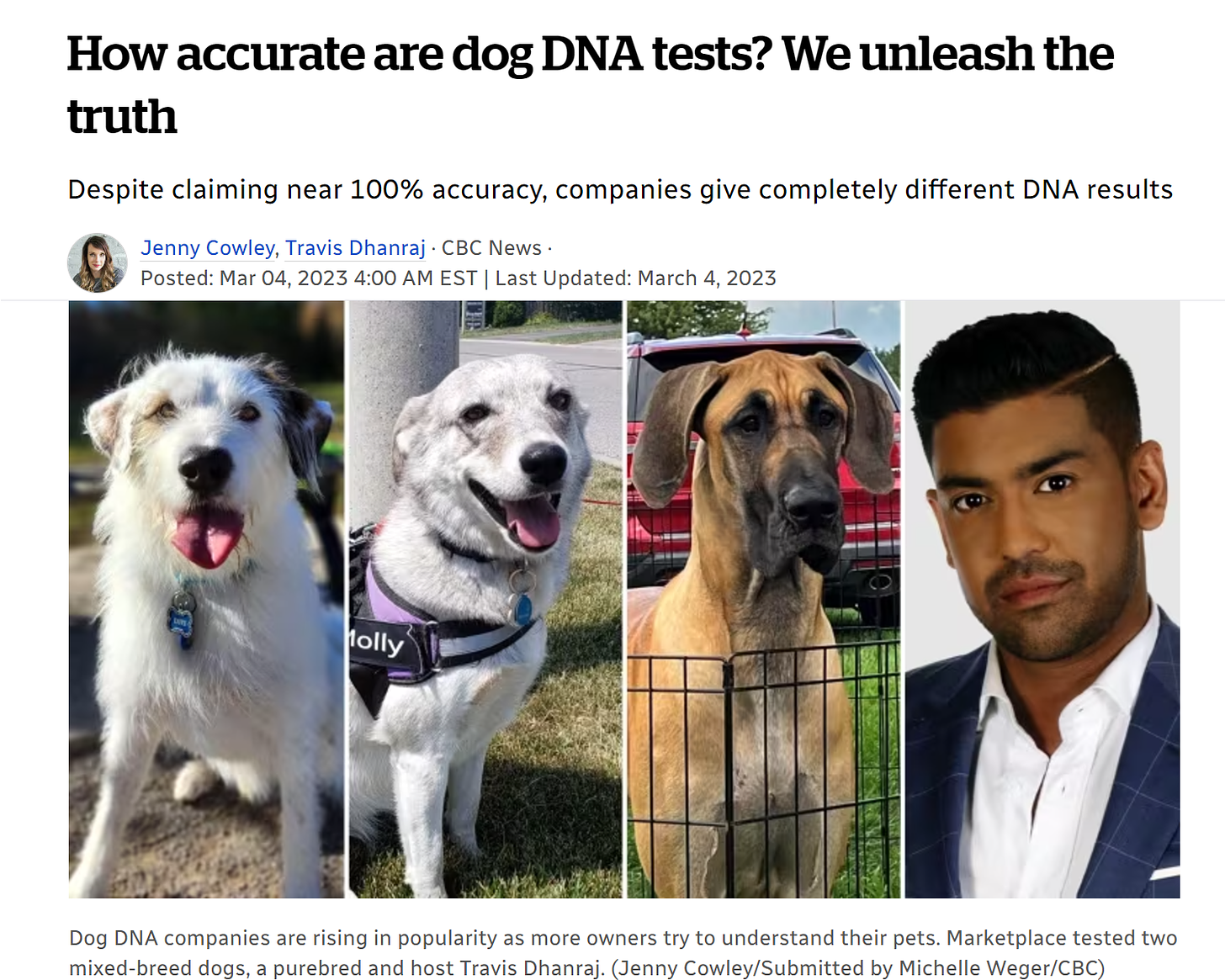
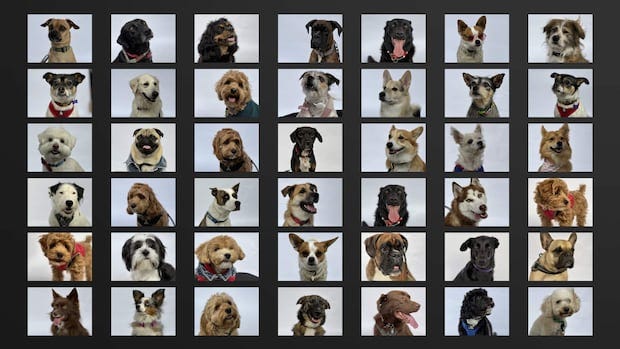
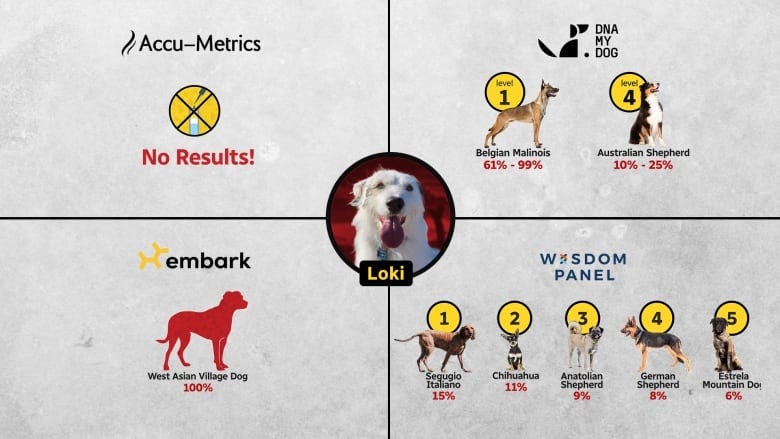
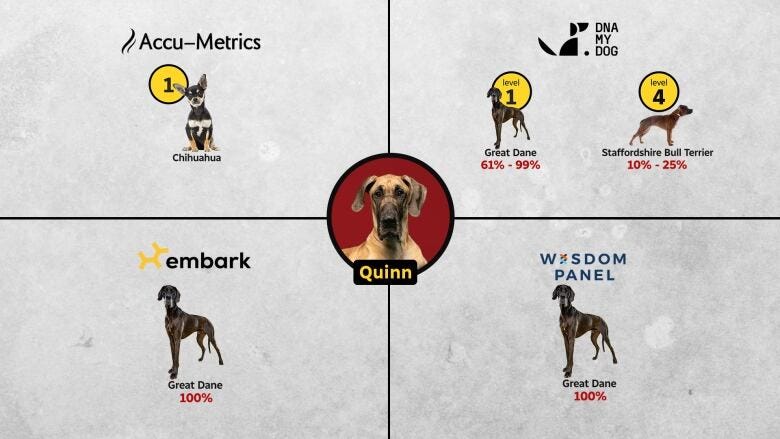
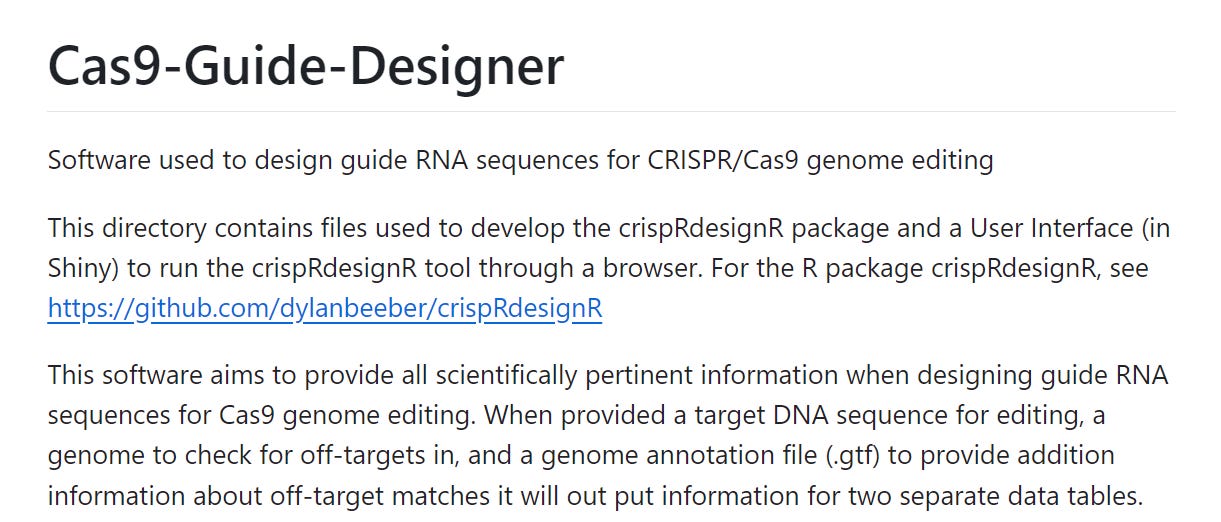



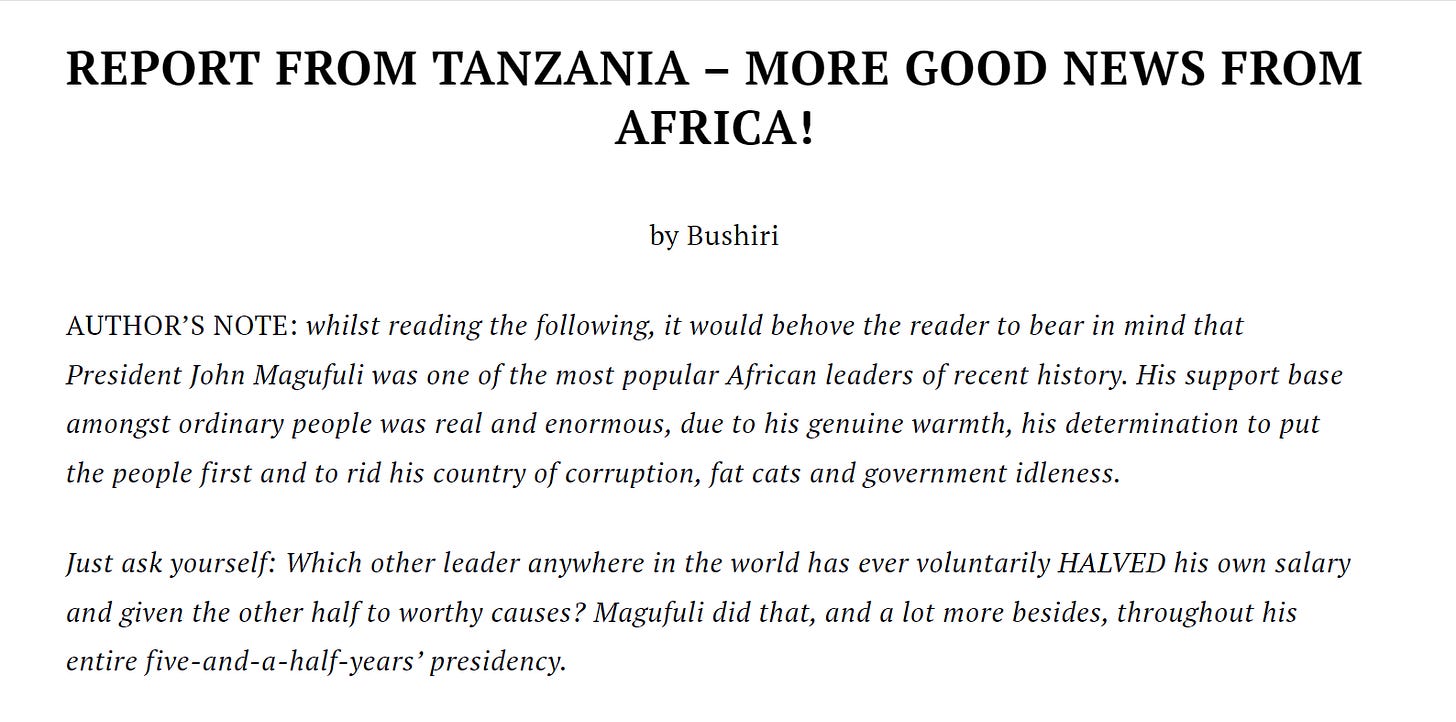
This dog thing is just stupid and absurd (people must have run out of junk to waste money on?), but the fraud of DNA has much more serious consequences. Yes, 'virus' hysteria scamdemics like 'HIV' and 'covid' are a HUGE problem. But also in the US, people are locked away in the Gulag, their lives destroyed, by the 'justice system'... or even executed... based on 'DNA evidence.' And the public is led to believe that this 'evidence' is 100% perfect, infallible.......... that is truly nightmarish. We need to expose the DNA fraud as well as the 'virus' fraud.....
By the way, here is an ongoing investigation of the DNA fraud (they are also investigating the 'virus' fraud, because really the two are very closely linked):
https://controlstudies.substack.com/p/the-dna-hoax
Why anyone needs to know your canine DNA? Really......how did we cope not knowing it for thousand of years?
It is the same with people. Actually physical traits often time give a much more accurate revelation...just looking at facial feature of hair color, bone structure, shape of face we can figure out a haplotype very closely. Blood type also gives us a window too.